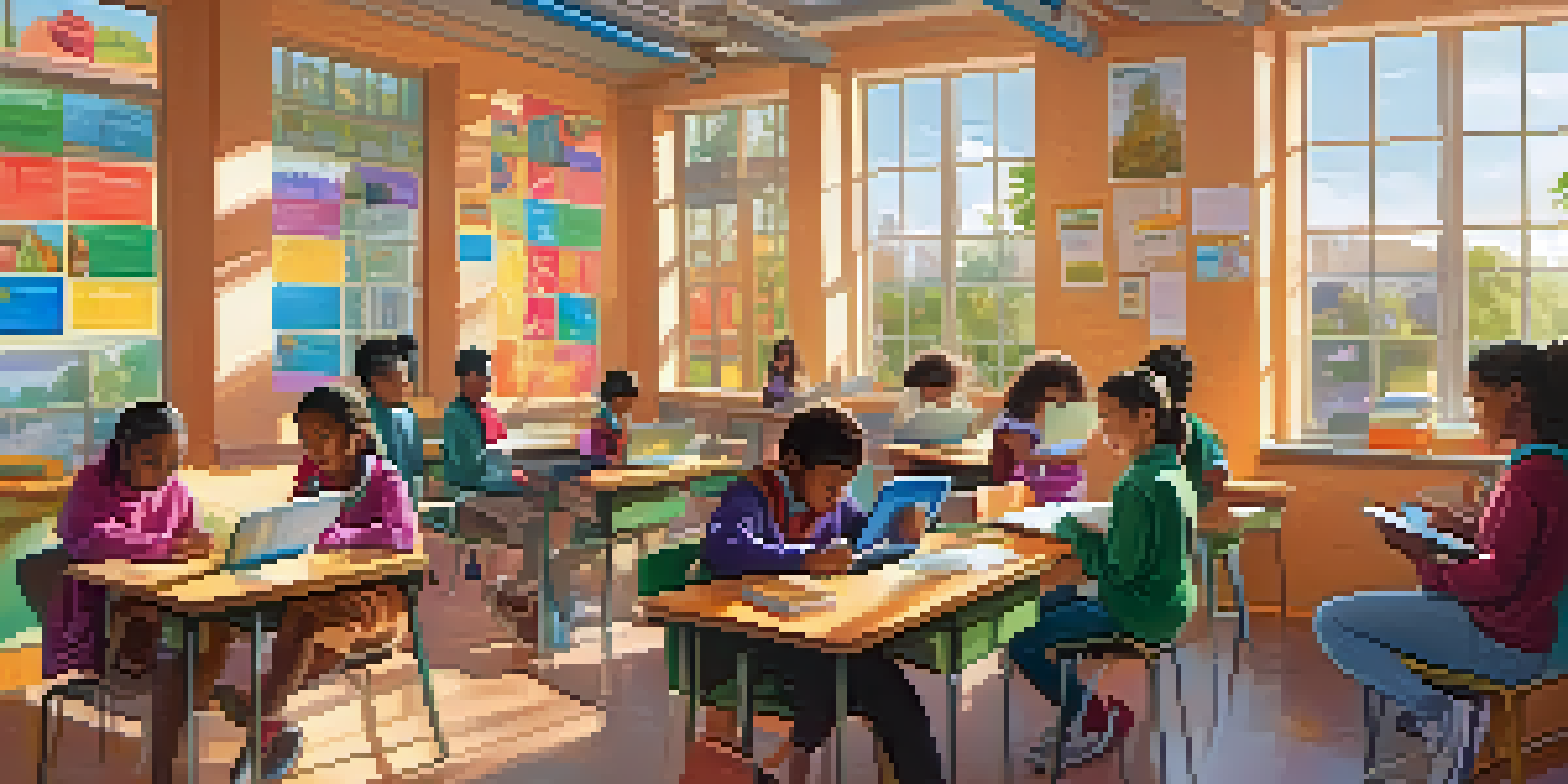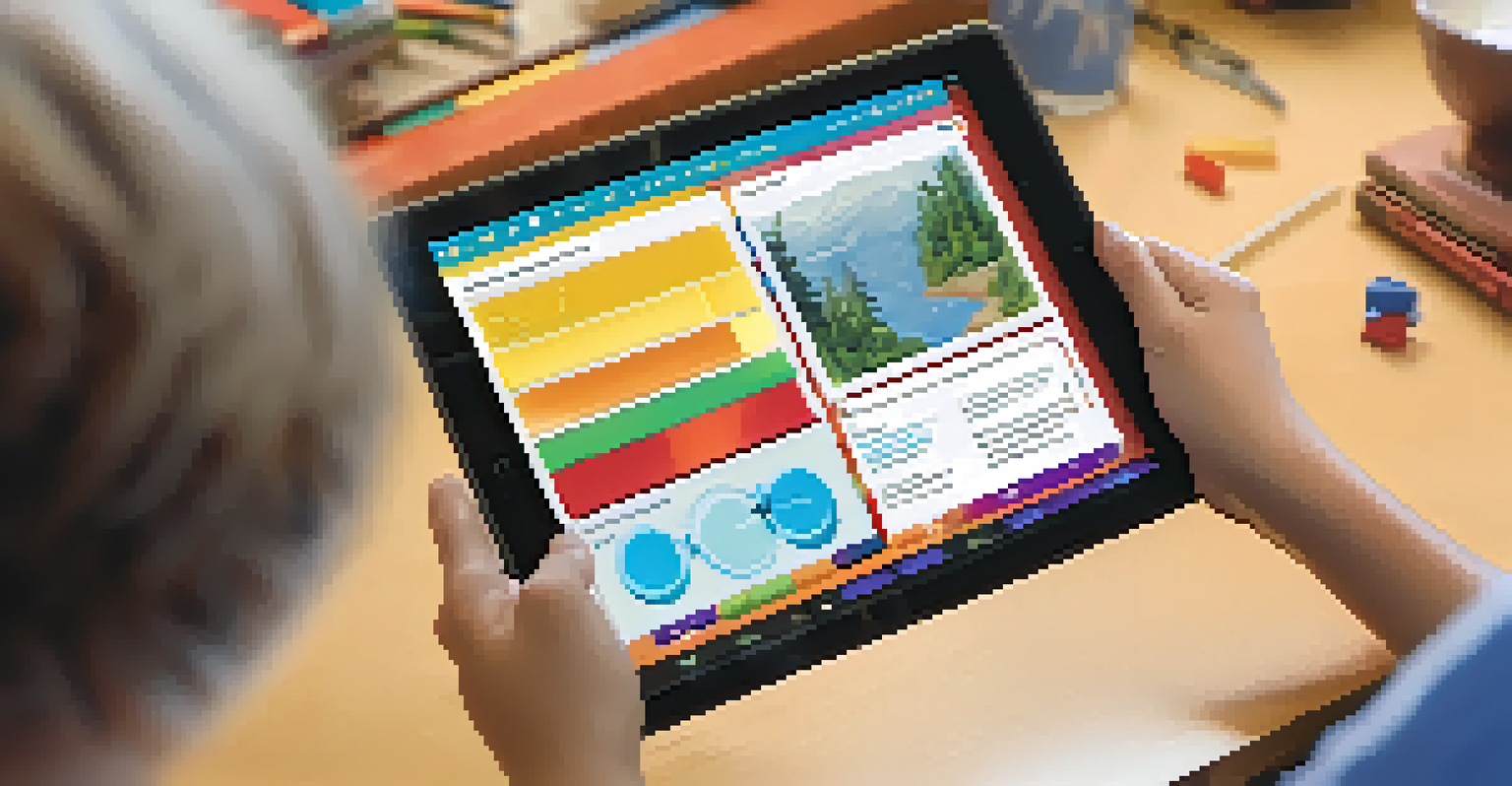Adaptive Learning and Cultural Considerations in Education

Understanding Adaptive Learning in Education
Adaptive learning is an educational approach that tailors learning experiences to individual needs. By utilizing technology, it adjusts content and pacing based on a student's performance and preferences. This means that each student can engage with material that suits their unique learning style and pace, making education more personalized and effective.
Education is not the filling of a pail, but the lighting of a fire.
For instance, if a student struggles with a particular math concept, an adaptive learning system can provide additional resources or alternative explanations to help them grasp the concept. This ability to pivot and adjust is what sets adaptive learning apart from traditional one-size-fits-all approaches. As a result, students are more likely to stay engaged and motivated throughout their learning journey.
Implementing adaptive learning requires a blend of technology and instructional design expertise. Educators must be trained to utilize these systems effectively and understand how to interpret the data they generate. This ensures that the learning environment remains dynamic and responsive to each student's evolving needs.
The Importance of Cultural Considerations
Cultural considerations play a pivotal role in education, influencing how students learn, engage, and interact. Different cultures have varying expectations and norms related to education, which can impact student performance and motivation. Understanding these cultural nuances helps educators create more inclusive and effective learning environments.

For example, in some cultures, collaborative learning is emphasized, while in others, individual achievement is prioritized. Recognizing these differences allows educators to adapt their teaching methods accordingly, ensuring that all students feel valued and understood. This cultural awareness fosters a greater sense of belonging, which is crucial for student success.
Personalized Learning Experience
Adaptive learning tailors educational content to fit individual student needs, enhancing engagement and motivation.
Moreover, integrating cultural considerations into adaptive learning systems can enhance their effectiveness. When educational content reflects diverse perspectives and backgrounds, students are more likely to connect with the material and see its relevance in their lives. This approach not only enriches the learning experience but also promotes cultural appreciation among peers.
Integrating Adaptive Learning with Cultural Sensitivity
Combining adaptive learning with cultural sensitivity involves a thoughtful approach to curriculum design. Educators must consider the diverse backgrounds of their students when developing course materials. By doing so, they can create content that resonates with all learners, fostering engagement and understanding.
The future belongs to those who believe in the beauty of their dreams.
For instance, incorporating stories, examples, or case studies from various cultures can help students relate to the material on a personal level. This not only enriches the learning experience but also encourages students to share their own perspectives, creating a vibrant classroom dialogue. Adaptive learning technologies can then be programmed to highlight these cultural elements.
Additionally, ongoing professional development for educators is essential in this integration process. Training on cultural competencies alongside adaptive learning technologies ensures that teachers are equipped to address the diverse needs of their students effectively. This creates a more inclusive educational environment where every student has the opportunity to thrive.
Challenges of Adaptive Learning and Cultural Integration
While the benefits of integrating adaptive learning and cultural considerations are clear, challenges remain. One major hurdle is the accessibility of technology. Not all students have equal access to devices or high-speed internet, which can hinder their ability to engage with adaptive learning platforms. Addressing this digital divide is crucial for equitable education.
Furthermore, educators may face difficulties in accurately assessing students' cultural backgrounds and learning preferences. Misunderstandings or biases can lead to ineffective adaptations of the learning experience. Therefore, it's essential for schools to foster an open dialogue about cultural diversity and provide training to help educators navigate these complexities.
Cultural Awareness in Education
Integrating cultural considerations into learning materials fosters inclusivity and helps students connect with the content.
Lastly, integrating technology in a culturally sensitive manner requires ongoing evaluation and adjustment. Educators must continuously monitor student engagement and performance, making necessary changes to ensure that both adaptive learning and cultural considerations are effectively met. This iterative process is vital for creating an enriching learning environment.
Benefits of Adaptive Learning for Diverse Learners
Adaptive learning offers numerous benefits for diverse learners, making education more accessible and effective. By personalizing the learning experience, students can engage with material at their own pace, which is particularly beneficial for those who may struggle in traditional classroom settings. This individualized attention can lead to improved academic outcomes.
Moreover, adaptive learning systems can identify gaps in knowledge and provide targeted resources to help students overcome challenges. For instance, if a student excels in reading but struggles with math, the system can adjust to focus more on math concepts. This tailored approach not only builds confidence but also encourages a growth mindset among learners.
Additionally, adaptive learning supports students with varying cultural backgrounds by acknowledging their unique experiences and perspectives. When educational content is designed with cultural relevance in mind, it fosters a deeper connection to the material, ultimately enhancing comprehension and retention. This holistic approach benefits all students, not just those from diverse backgrounds.
Examples of Adaptive Learning Platforms
Several adaptive learning platforms have emerged, showcasing the potential of this educational approach. Programs like DreamBox and IXL provide personalized math instruction, adjusting the difficulty level based on each student's responses. These platforms create a tailored learning journey that keeps students engaged and motivated to improve.
Another example is Knewton, which offers adaptive learning technology across various subjects. It analyzes student performance in real-time and provides customized recommendations, ensuring that learners receive the support they need. By incorporating diverse content that reflects different cultures, Knewton enhances its relevance for a broader audience.
Challenges in Adaptive Learning
Addressing technology accessibility and understanding cultural backgrounds are crucial for effective implementation of adaptive learning.
These platforms not only demonstrate the effectiveness of adaptive learning but also highlight the importance of cultural considerations. By integrating culturally relevant materials, they create inclusive learning environments that cater to the diverse needs of students, paving the way for a more equitable educational landscape.
The Future of Adaptive Learning in Culturally Diverse Classrooms
As education continues to evolve, the future of adaptive learning looks promising, especially in culturally diverse classrooms. The integration of artificial intelligence and machine learning can further enhance adaptive learning systems, enabling them to better understand and respond to students' unique needs. This technological advancement will likely lead to more personalized and effective learning experiences.
Moreover, as educators become more aware of the importance of cultural considerations, we can expect to see an increased emphasis on inclusive practices in adaptive learning. This shift will not only benefit students from diverse backgrounds but will also enrich the learning experience for all students by fostering a deeper understanding of global perspectives.

Ultimately, the future of adaptive learning in education lies in its ability to embrace diversity and inclusivity. By prioritizing both personalized learning experiences and cultural sensitivity, we can create educational environments that empower every student to succeed, transforming the landscape of education for generations to come.